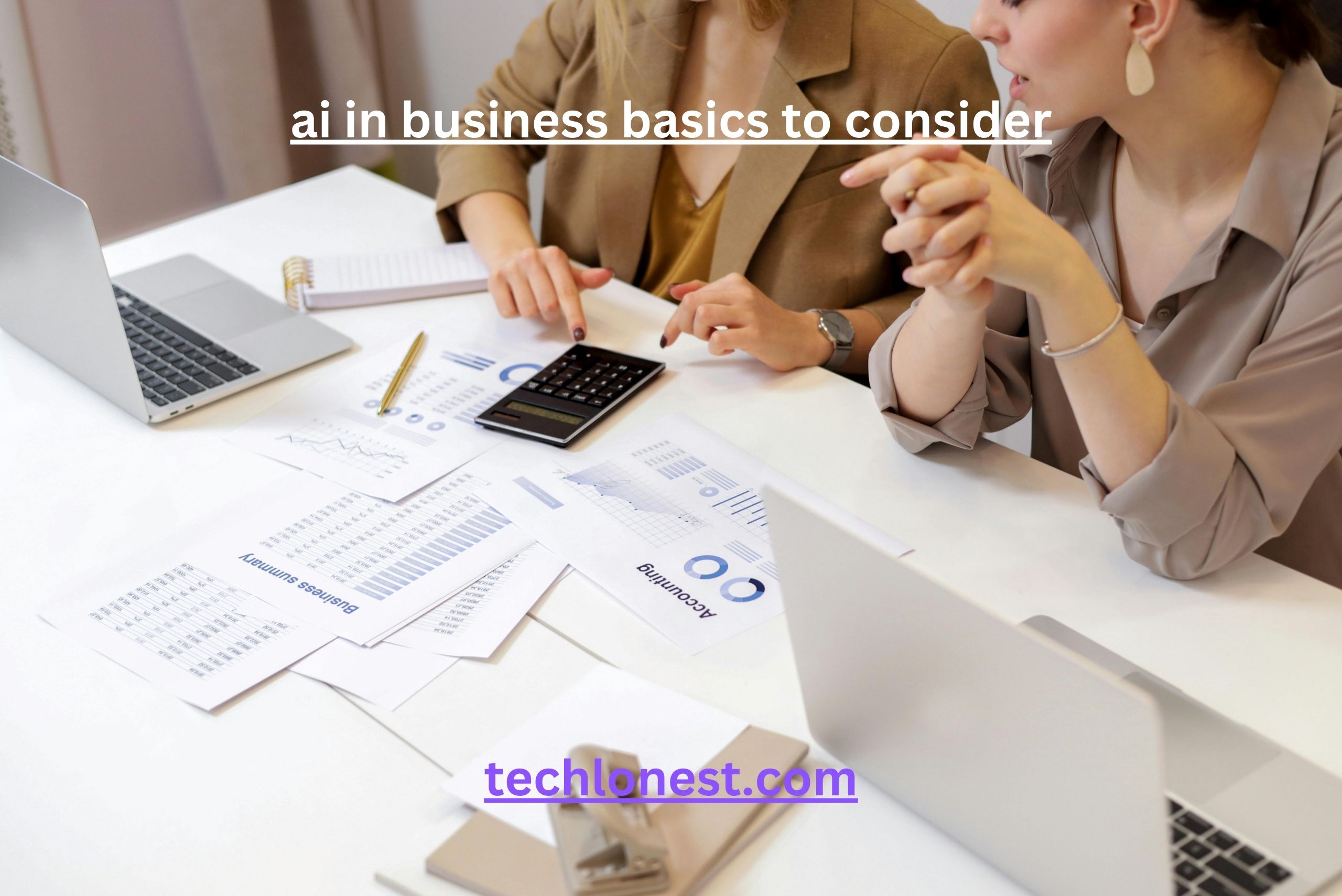In cutting-edge speedy-paced and era-pushed global, Artificial Intelligence (AI) in commercial enterprise fundamentals to consider has grown to be an important subject matter for companies aiming to stay competitive. Whether you’re a small startup or a big agency, knowing the basics of AI and how it may be integrated into your commercial enterprise approach is essential. This comprehensive guide explores the fundamentals of AI in commercial enterprise and Ai in business basics to consider, offering insights, examples, and practical steps that will help you harness the strength of AI effectively.
What is AI in Business?
What is AI in an enterprise? Simply put, Artificial Intelligence refers to the development of laptop structures that could carry out responsibilities typically requiring human intelligence. These obligations encompass gaining knowledge of, reasoning, problem-solving, perception, and language understanding. In a commercial enterprise context, AI can revolutionize operations, beautify customer reports, and drive innovation.
Key Components of AI in Business
- Machine Learning (ML): Enables structures to learn from records and improve over time without express programming.
- Natural Language Processing (NLP): Allows machines to understand and reply to human language.
- Computer Vision: Empowers machines to interpret and make decisions based totally on visual statistics.
- Robotic Process Automation (RPA): Automates repetitive and mundane obligations, and growing performance.
For instance, a retail organization would possibly use NLP to investigate patron opinions and benefit insights into patron alternatives, even as pc imaginative and prescient can assist in stock management with the aid of automatically tracking inventory tiers.

Artificial Intelligence in Business Examples
Artificial intelligence in business examples displays the diverse applications of AI throughout diverse industries. These examples spotlight how AI can force performance, beautify decision-making, and create new possibilities.
1. Customer Service Automation
AI-powered chatbots and digital assistants provide instant aid to clients, dealing with inquiries, processing orders, and resolving issues around the clock. This now not only improves consumer satisfaction but additionally reduces the workload on human retailers.
Imagine a scenario wherein a client has a question approximately a product at nighttime. An AI chatbot can instantly offer the necessary records, ensuring the patron gets timely help without waiting till commercial enterprise hours.
2. Predictive Analytics
Businesses use AI-pushed predictive analytics to forecast tendencies, consumer behavior, and marketplace demands. This allows for proactive decision-making, inventory control, and personalized marketing strategies.
For example, an e-commerce platform can analyze beyond buying facts to predict future income trends, permitting higher inventory-making plans and centered marketing campaigns.
3. Supply Chain Optimization
AI complements supply chain control by optimizing logistics, predicting delays, and coping with inventory degrees. This leads to cost savings, advanced efficiency, and better useful resource allocation.
Consider a production business enterprise that makes use of AI to expect capacity deliver chain disruptions. By looking forward to those troubles, the organization can regulate its logistics plans proactively, minimizing downtime and retaining manufacturing schedules.
4. Personalized Marketing
AI allows groups to create highly personalized advertising and marketing campaigns via reading consumer information and possibilities. This leads to extra powerful targeting, better engagement quotes, and increased conversion charges.
For instance, streaming offerings like Netflix use AI to suggest content material based totally on individual viewing histories, enhancing consumer delight and retention.
Benefits of AI in business basics to consider
Understanding the benefits of AI in business is critical for making informed choices approximately AI adoption. Here are some of the important thing advantages:
1. Increased Efficiency
AI automates repetitive and time-consuming responsibilities, allowing employees to be conscious of more strategic and creative sports. This results in higher productiveness and faster turnaround times.
2. Cost Savings
By automating methods and lowering the want for manual exertions, AI can substantially decrease operational fees. Additionally, AI-driven insights can assist in identifying areas where costs can be minimized.
3. Enhanced Decision Making
AI analyzes giant quantities of information to provide actionable insights, allowing corporations to make informed and records-driven choices. This improves basic overall performance and competitiveness.
4. Improved Customer Experience
AI personalizes patron interactions, offering tailor-made recommendations and help. This enhances customer delight and loyalty, leading to accelerated income and repeat commercial enterprise.
5. Innovation and Growth
AI fosters innovation by allowing the improvement of recent services and products. It additionally opens up new revenue streams and markets, using commercial enterprise increase.
For instance, AI-pushed innovation in the automobile enterprise has brought about the improvement of self-sufficient motors, remodeling transportation, and the development of new commercial enterprise possibilities.
Disadvantages of AI in business basics to consider
While AI gives numerous blessings, it’s crucial to not forget the risks of AI in business to make balanced and informed selections.
1. High Implementation Costs
The initial funding required for AI technologies can be good sized, specifically for small and medium-sized businesses. This includes prices related to software, hardware, and skilled personnel.
2. Data Privacy and Security Concerns
AI structures cope with widespread amounts of touchy data, raising issues about statistics’ privateness and protection. Ensuring compliance with information safety regulations and safeguarding against cyber threats is paramount.
3. Job Displacement
Automation of obligations can cause activity displacement, particularly for roles concerning repetitive and guide obligations. This can bring about group of workers demanding situations and require agencies to spend money on worker retraining and upskilling.
4. Dependence on Data Quality
AI systems rely closely on records pleasant. Inaccurate, incomplete, or biased data can result in mistaken insights and choices, undermining the effectiveness of AI programs.
5. Ethical and Bias Issues
AI algorithms can inadvertently perpetuate biases present inside the schooling statistics, main to unfair or discriminatory outcomes. Addressing moral concerns is critical to make certain responsible AI usage.
For example, if an AI hiring tool is trained on biased statistics, it could want positive demographics over others, main to discriminatory hiring practices.
Artificial Intelligence in Business PDF and Research Papers
For the ones seeking to delve deeper into AI in commercial enterprise basics don’t forget, that numerous resources are available in PDF format and study papers. These files offer special analyses, case studies, and complete insights into AI applications in various commercial enterprise contexts.
1. AI in Business Basics to Consider PDF
A PDF on AI in business basics to don’t forget usually consists of an overview of AI technology, implementation techniques, advantages, challenges, and case research. These files serve as valuable references for commercial enterprise leaders and choice-makers.
You can download a comprehensive AI in Business Basics to Consider PDF to explore distinctive statistics and practical guidance.
2. AI in business basics to consider Research Paper
An ai in business basics to consider research paper offers in-depth evaluation and empirical studies on the impact of AI in unique industries. These papers make a contribution to the academic and sensible knowledge of AI’s function in commercial enterprise transformation.
Access a properly-researched AI in Business Research Paper to gain deeper insights into AI applications and their implications.

Ai in business basics to consider Essay
Writing an AI in business fundamentals to recall essay includes discussing the fundamental components of AI in business, such as its definition, applications, blessings, and challenges. Such essays are useful for instructional functions, business reviews, and strategic planning.
Structure of an AI in Business Basics to Consider Essay
Introduction
- Define AI in an enterprise.
- Highlight the significance of knowledge of AI fundamentals.
Body
- Discuss key AI technologies and their programs.
- Explore the blessings and blessings of AI in commercial enterprise.
- Address the challenges and ability drawbacks.
- Provide actual global examples and case research.
Conclusion
- Summarize the key points.
- Emphasize the destiny potentialities of AI in business.
An example essay can be found here, presenting a complete evaluation of AI basics inside the commercial enterprise panorama.
Benefits of AI in business basics to consider
Exploring the benefits of AI in business exhibits how AI can transform various factors of a corporation, using efficiency, innovation, and growth.
1. Automation of Routine Tasks
AI automates repetitive duties consisting of facts access, scheduling, and consumer inquiries. This reduces the workload on personnel, letting them focus on higher-cost activities.
2. Enhanced Data Analysis
AI excels at processing and reading big datasets, uncovering patterns and trends that are probably missed by human analysts. This leads to extra accurate and actionable insights.
3. Improved Customer Insights
AI analyzes consumer conduct and preferences, supplying corporations with a deeper expertise in their target audience. This allows customized advertising and higher patron engagement.
4. Increased Operational Efficiency
By optimizing approaches and workflows, AI enhances normal operational performance. This results in faster turnaround times, reduced costs, and advanced aid utilization.
5. Innovation and New Opportunities
AI drives innovation using allowing the creation of the latest products, offerings, and business fashions. It opens up new markets and sales streams, fostering commercial enterprise growth.
For example, AI-powered advice systems have revolutionized the e-commerce enterprise by offering personalized product hints, improving the purchasing revel and boosting sales.
AI in business basics to consider Research Paper
A nicely crafted AI in business research paper delves into the theoretical and realistic aspects of AI programs in commercial enterprises. It examines the effects, blessings, challenges, and future traits of AI in various industries.
Key Components of an AI in Business Research Paper
Abstract
- Summarize the study’s targets, methodology, and key findings.
Introduction
- Introduce the subject and its significance in the enterprise context.
Literature Review
- Review present studies and theories associated with AI in enterprise.
Methodology
- Describe the research techniques and statistics series techniques used.
Results and Discussion
- Present and examine the research findings.
Conclusion
- Summarize the look at and advise destiny research guidelines.
References
- Cite all assets used in the research.
Access an in-depth AI in Business Research Paper to explore comprehensive studies and analyses on the difficulty.
AI in Business Basics to Consider PDF
Having a PDF on AI in business fundamentals to keep in mind is precious for brief reference and in-depth observation. These documents regularly compile vital statistics, satisfactory practices, and actionable techniques for integrating AI into commercial enterprise operations.
Advantages of Using AI in Business PDF Resources
- Portability: Easily handy on diverse gadgets for on-the-cross reference.
- Comprehensive Content: Covers an extensive range of topics related to AI in business.
- Visual Aids: Includes charts, graphs, and diagrams to demonstrate key factors.
- Practical Insights: Offers actual global examples and case studies for better information.
Download an unfastened AI in Business Basics to Consider PDF to decorate your knowledge and guide your AI implementation adventure.
Step-with the aid of-Step Guide to Implementing AI in Your Business
Integrating AI into your commercial enterprise requires a strategic approach. Follow this step-by-step guide to ensure a successful AI implementation.
Step 1: Identify Business Needs
Begin by way of assessing your enterprise methods to perceive areas where AI can add the fee. Look for obligations that are repetitive, time-consuming, or require fact analysis.
For example, an organization would possibly identify customer service as a key place wherein an AI chatbot can decorate performance and customer pleasure.
Step 2: Define Clear Objectives
Set specific, measurable desires for your AI tasks. Whether it’s lowering operational fees, improving client experience, or increasing income, clear objectives will manual your implementation approach.
Step 3: Assess Data Quality and Availability
AI structures depend upon amazing data. Evaluate the information you have and ensure it’s far accurate, relevant, and well-prepared. Address any statistics gaps or pleasant problems before intending.
Step 4: Choose the Right AI Tools and Technologies
Select AI gear that aligns with your business needs and goals. Consider factors which include scalability, ease of integration, and vendor guide.
Popular AI gear include Salesforce Einstein for CRM, ChatGPT for customer service, and IBM Watson for information analytics.
Step 5: Develop an Implementation Plan
Create an in-depth plan outlining the stairs, timeline, and assets required for AI integration. Assign duties and set milestones to tune progress.
Step 6: Pilot Testing
Before a full-scale rollout, conduct pilot exams to assess the performance of AI tools. This helps them become aware of ability troubles and lets in adjustments based on comments.
Step 7: Train Your Team
Provide comprehensive education for your personnel to ensure they’re comfortable using AI equipment. Encourage a culture of non-stop mastering and variation.
Step 8: Monitor and Optimize
After implementation, continuously screen the overall performance of AI systems. Gather feedback, analyze effects, and make important changes to optimize AI programs.
For example, frequently overview the performance metrics of an AI chatbot to make sure it meets customer service desires and makes enhancements as wanted.
Overcoming Challenges in AI Adoption

Adopting AI in an enterprise comes with its set of challenges. Here’s how to overcome some of the not-unusual boundaries:
1. Addressing Resistance to Change
Employees may be hesitant to adopt AI due to fear of job displacement or unfamiliarity with new technologies. To mitigate this, talk about the blessings of AI, involve employees in the implementation process, and provide schooling to ease the transition.
2. Ensuring Data Privacy and Security
Protecting sensitive information is paramount. Implement strong security measures, observe facts protection policies, and ensure that AI systems take care of facts responsibly.
3. Managing High Initial Costs
While the long-term advantages of AI can outweigh the preliminary charges, companies can start with small-scale implementations to demonstrate ROI. Gradually scale up because the value of AI becomes glaring.
4. Overcoming Data Quality Issues
Invest in information control practices to ensure the accuracy and reliability of your records. Regularly clean and replace your datasets to hold data integrity.
5. Navigating Ethical Considerations
Develop moral recommendations for AI usage to save your biases and make sure of truthful effects. Regularly evaluate and replace those suggestions to align with evolving requirements and rules.
For example, a business enterprise might set up an AI ethics committee to oversee AI initiatives and make certain they adhere to ethical standards.
Artificial Intelligence in Business PDF Resources
Accessing Artificial intelligence in enterprise PDF resources can provide in-depth knowledge and practical insights for agencies looking to enforce AI. These PDFs frequently include comprehensive courses, case studies, and strategic frameworks.
Top AI in Business PDF Resources
- “AI in Business: A Comprehensive Guide” – Offers a top-level view of AI technologies, implementation techniques, and actual-global programs.
- “The Future of AI in Business” – Explores rising developments, destiny possibilities, and the evolving position of AI in numerous industries.
- “AI Strategy for Business Leaders” – Provides strategic frameworks and exceptional practices for integrating AI into business operations.
Download a treasured Artificial Intelligence in Business PDF to beautify your understanding and manual your AI initiatives.
AI in Business Basics to Consider Essay
Crafting an AI in enterprise basics to take into account the essay involves articulating the essential principles, advantages, demanding situations, and applications of AI in an enterprise setting. This essay serves as an academic or expert exploration of ways AI can remodel commercial enterprise operations.
Key Elements of an AI in Business Basics to Consider Essay
Introduction
- Define AI and its relevance in the enterprise.
- Present the thesis declaration outlining the essay’s attention.
Body
- Discuss the diverse AI technologies and their commercial enterprise packages.
- Explore the blessings of AI, along with performance, cost savings, and more desirable decision-making.
- Address the demanding situations, including implementation prices, information privacy, and ethical worries.
- Provide real-global examples of a successful AI integration in corporations.
Conclusion
- Summarize the important thing points mentioned.
- Highlight the destiny capability of AI in enterprise and its transformative effect.
For a detailed instance, consult with this AI in Business Basics to Consider Essay.
Conclusion
Understanding the AI in business basics to take into account is important for leveraging the overall potential of AI technologies. From enhancing patron reviews to optimizing operations, AI gives a plethora of advantages that can power enterprise increase and innovation. However, successful AI integration calls for cautious making plans, addressing challenges, and continuous optimization. By following the guidelines and techniques mentioned in this text, companies can hopefully embark on their AI adventure, positioning themselves for sustained success in the virtual age.
Frequently Asked Questions (FAQ)
1. What is Artificial Intelligence (AI) in enterprise?
Artificial Intelligence (AI) in enterprise refers to the usage of superior algorithms and software programs to perform duties that normally require human intelligence. These tasks include facts analysis, decision-making, customer service, and more. AI helps businesses automate techniques, gain insights from records, and beautify ordinary performance.
2. How can AI advantage my business?
AI gives several blessings, such as expanded performance by way of automating repetitive tasks, value discounts with the aid of minimizing the want for giant human sources, improved choice-making through data-pushed insights, and more advantageous customer revel by way of personalizing interactions. These blessings together contribute to higher productivity and competitiveness.
3. What are a few common AI tools used in groups?
Common AI equipment utilized in businesses include Customer Relationship Management (CRM) structures like Salesforce Einstein, AI-powered chatbots consisting of ChatGPT, predictive analytics equipment like IBM Watson, and advertising and marketing automation systems like HubSpot. These tools cater to numerous commercial enterprise features, from customer support to marketing and facts evaluation.
4. What should I keep in mind earlier than implementing AI in my commercial enterprise?
Before imposing AI, consider defining clear objectives for what you propose to attain, assessing the nice and relevance of your data, ensuring that AI gear can integrate seamlessly together with your existing systems, and offering ok education to your employees. These considerations help in attaining an easy and powerful AI integration.
5. How can I begin with AI in my commercial enterprise?
To get started out with AI, begin by assessing your present-day capabilities and identifying the regions wherein AI can upload value. Define your AI desires, pick out the proper AI tools or companions, develop a complete implementation plan, train your team, and continuously reveal and compare the overall performance of AI systems. Starting small and scaling progressively can help control fees and display ROI.
6. What are the demanding situations of adopting AI in an enterprise?
Adopting AI can present challenges which include resistance to change from employees, records privateness and protection worries, and excessive initial prices. Overcoming these challenges includes powerful communication, ensuring compliance with statistics protection regulations, imposing robust security features, and demonstrating the cost of AI via small-scale implementations earlier than scaling up.
7. Is AI appropriate for small corporations?
Yes, AI is appropriate for small groups. With the availability of scalable AI equipment and offerings, small organizations can leverage AI to automate duties, benefit from insights from data, and beautify consumer interactions without significant advance investments. Starting with cheap AI answers like chatbots or marketing automation equipment can offer instant blessings and pave the way for in addition AI adoption.
8. How does AI enhance purchaser experience?
AI improves patron enjoyment by using personalizing interactions, offering immediate support through chatbots, predicting patron desires, and presenting tailor-made tips. These abilities result in greater satisfying and efficient customer interactions, fostering loyalty and repeat enterprise.
9. What is the future of AI in commercial enterprise?
The destiny of AI in commercial enterprise is promising, with endured improvements in devices gaining knowledge of, natural language processing, and automation. AI will more and more end up vital to commercial enterprise techniques, driving innovation, enhancing performance, and creating new opportunities across diverse industries.
10. How can I measure the achievement of AI implementation in my enterprise?
Measuring the success of AI implementation involves placing clean metrics aligned with your targets, inclusive of improved efficiency, cost financial savings, stepped forward patron delight, and sales boom. Regularly screen these metrics, gather remarks, and alter your AI approach as needed to ensure that AI keeps adding value to your business.
By understanding and enforcing AI in commercial enterprise basics to keep in mind, you can release new potentials and live ahead in the aggressive landscape. Embrace the future with AI, and watch your enterprise thrive.
